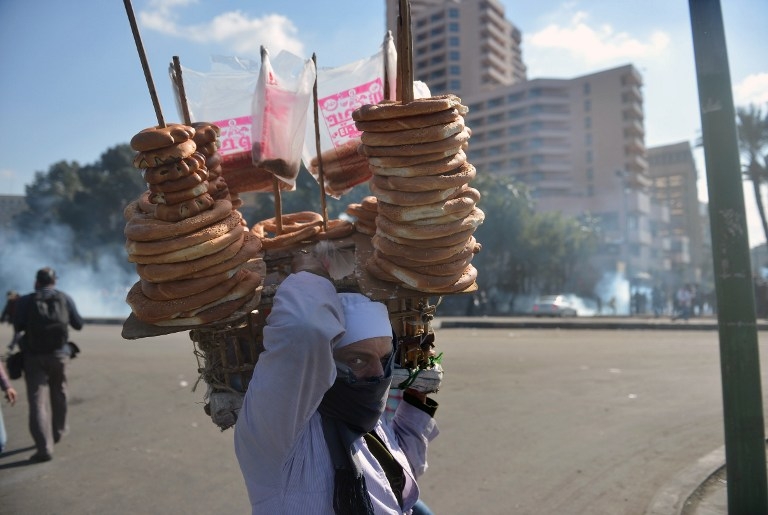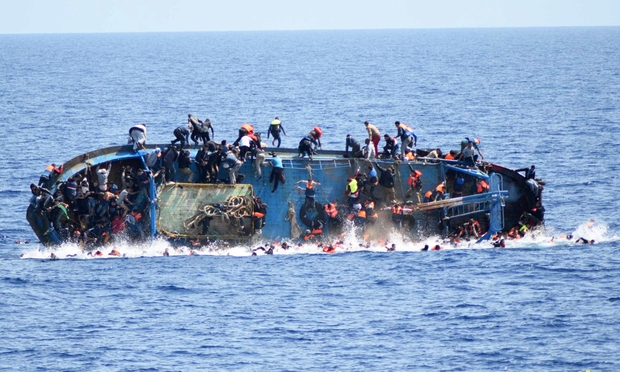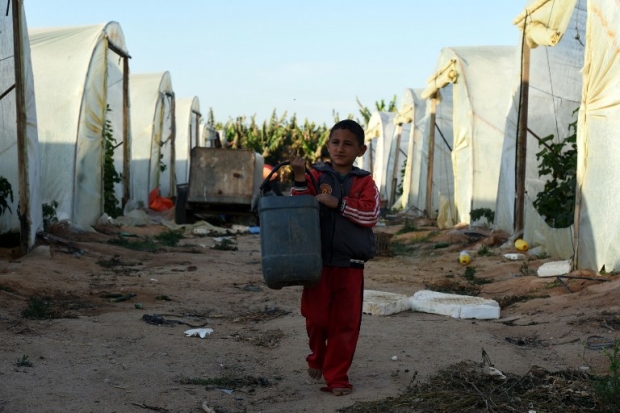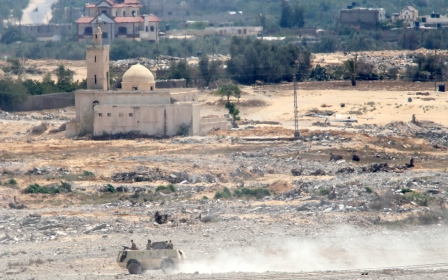Die in poverty or at sea: The choice facing millions of Egyptians

“The happy and powerful do not go into exile, and there are no surer guarantees of equality among men than poverty and misfortune," Alexis de Tocqueville said in his 1840 Democracy in America.
Tocqueville's words clearly reflect Egypt’s harsh reality today. Five years after an uprising called for "bread, freedom and social justice", President Abdul Fattah al-Sisi’s repressive policies and bad governance are forcing a wave of Egyptians, mostly children and adolescents from disadvantaged rural areas, to flee a crumbling economy, impoverished conditions and a widespread sense of disempowerment.
Sisi’s repressive policies and bad governance are forcing an influx of Egyptians, mostly children and adolescents from disadvantaged rural areas, to flee
The counter-revolutionary forces, the Deep State's "happy and powerful" - including military and security forces, former president Hosni Mubarak’s cronies, corrupt businessmen, politicised parts of the judiciary, and a large segment of the population brainwashed by Sisi’s mouthpieces - are building their power on the living corpses of more than 25 million Egyptians.
These millions, who represent more than a quarter of the population, live below the poverty line – or a monthly income of $54.28 monthly, according to official statistics.
For these Egyptians, there are only two options: die from poverty or find a way to flee the country as the last resort for survival.
So for the poor and misfortunate, Egypt has become like the mouth of a shark, an increasingly popular starting place for the risky journey across the Mediterranean to Europe.
'I will try it again'
No matter how dangerous the trip is, it is more bearable for many young people than remaining in Egypt. Overseas exile is not as harsh as living at home where there is no exit from a vicious cycle of uncertainty.
'I will try it again. No point to stay here where there is no livelihood,' said a 15-year-old child who survived a boat wreck enroute to the Mediterranean from Egypt
The government’s repressive policies and squandering of $23bn in aid from Saudi Arabia, the UAE and Kuwait in 2014 have created a domino effect. The inflation rate jumped to 15.5 percent in August with expectations that it will reach 20 percent by year-end. The Egyptian pound is plummeting against the dollar, electricity prices have soared and the unemployment rate for 15-to-29-year-olds reached 27.3 percent, all factors that have led to a widening budget deficit after foreign reserves were drained.
In the midst of this meltdown, a capsised boat sank eight miles off the Egyptian coast on 21 September, leaving 204 people drowned, including several children and teenagers. At this point, the number of drownings this year has surpassed the figure recorded last year of 3,771 which was the highest ever recorded.
Between January and May, a total of 1,815 Egyptian migrants landed on the Italian shores, including 1,147 unaccompanied children (or 78 percent of all those who arrived), ranking Egypt as the number one country from which unaccompanied children are leaving, according to the Egyptian office of the International Organisation of Immigration (IOM).
“I want to tell you that any of our youth, to make this trip, have to pay large amounts of money that either they can afford or borrow,” President Sisi said in a speech five days after the catastrophe. “Guys, our country deserves more - honestly, we are not leaving you alone.”
Sisi’s attempt to disassociate irregular emigration from bad governance reflects his ignorance of the deadly poverty and deteriorating living conditions that are motivating children and even entire families to risk such deadly journeys.
Several survivors of the catastrophe confirmed that they only paid small deposits or signed contracts to pay for their trips once they arrived in Italy and earned some money.
“I will try it again. No point to stay here where there is no livelihood,” a 15-year-old boy, one of the survivors, told a TV reporter, confirming that he signed a contract to pay a smuggler $1,800 after he arrived.
Unswayed by the accounts about those who have drowned at sea, several other survivors also expressed their determination to attempt the dangerous trip over and over again until they reach the Italian shore as a result of “unbearable living conditions”.
If not poverty, why flee?
Even assuming that the young people had “large amounts of money” in Sisi’s words, the fact that they still insist on repeating the perilous trip to Europe reflects their insistence that there is no point investing their saved money in any future in the country.
The general investment climate, which is becoming fruitless, doesn’t appeal either to investors with larger capacities. Also, the fact that most of the irregular migrants come from Egypt’s rural areas suggests the gravity of the deterioration of living conditions there.
After decades of Mubarak’s neoliberal policies, agriculture, which was once a major source of income for Egyptians, has declined. Yet even internal migration of young people from rural to urban areas in the wake of that decline becomes less attractive as the economic nightmare casts its spell across every corner of the country.
Staying away from the security harassment in Egypt, including forced disappearances, killings, imprisonment and torture, they seek asylum and the safety of host countries.
Immigration to the Islamic State (IS) group in Syria and Iraq is also a byproduct of Sisi’s zero tolerance of the Islamist movement since 2013. Several battered Islamists who were rendered voiceless after brief political participation following the uprising in 2011 have found refuge in either the IS franchise in Sinai or al-Qaeda or IS in Syria and Iraq.
Recently, the Syria-based al-Nusra Front leader said that more than 1,300 Egyptians have joined the organisation since the 2013 military coup. Among those jihadists, he said, are adolescents such as al-Baraa Mahmoud, a 14-year-old teenager who fled the country two years ago and, despite his young age, was involved in the group’s militant operations until he was killed recently.
Giving up not even an option
Today in Egypt, the only way to survive is to give up dreaming about a better future and to never resist, no matter how much you are oppressed. This is actually what Sisi wants.
Here, a dream will cost a life. To protest for change, you risk injury or death by the random bullets of the security forces. Even if you have nothing to do with politics and you decide to flee the deteriorating conditions, you may die anyway, drowning in the rough waves of the Mediterranean with no one to rescue you.
Giving up is not enough - even pessimistic views can get you rounded up these days
And giving up is not enough. Even pessimistic views can get you rounded up these days. Just days after the boat tragedy, social media was abuzz with mockery after the Interior Ministry announced its forces had arrested a group of people over charges of “creating a pessimistic climate”. “They had fabricated and provoke crises,” the ministry said, “in order to claim that the state had failed to implement development plans.”
A tuk-tuk driver in Mansoura, one of the major provinces from which young people flee the economic crisis, set off a media storm this week when his comments were aired on Egyptian TV.
“In TV, Egypt appears like Vienna, in the street, it is a nephew of Somalia and Chad,” he said.
“What a shame this has been done to Egypt! Is this Egypt which was a creditor for Britain? Is there anybody who loves Egypt to say no to a bunch of salespeople who fooled people, raising banners of democracy, nationalism and social justice and they are all liars?”
Zainab al-Mahdi put it a different way: “Tired, worn out, it is useless.” This was her last Facebook post before she took her life in 2014 after life in Egypt under military rule had become unbearable.
Like Egyptians who escape poverty and misfortune, her death was also a great escape to find our stolen freedom and justice somewhere else.
- Muhammad Mansour is a journalist from Egypt, who covered the Arab uprisings, and who writes about Egyptian affairs, Sinai insurgency and broader Middle Eastern issues. For more details, visit www.muhammadmansour.com.
The views expressed in this article belong to the author and do not necessarily reflect the editorial policy of Middle East Eye
Photo: An Egyptian street vender selling bread walks past as a tear gas canister fired by riot police during clashes with protesters near Cairo's Tahrir Square in January 2013 (AFP).
This article is available in French on Middle East Eye French edition.
New MEE newsletter: Jerusalem Dispatch
Sign up to get the latest insights and analysis on Israel-Palestine, alongside Turkey Unpacked and other MEE newsletters
Middle East Eye delivers independent and unrivalled coverage and analysis of the Middle East, North Africa and beyond. To learn more about republishing this content and the associated fees, please fill out this form. More about MEE can be found here.







